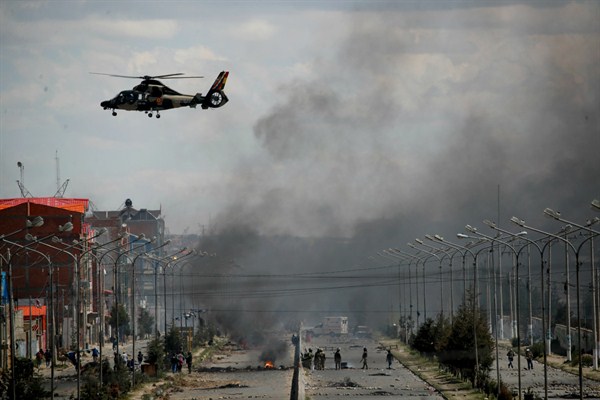It’s been a little over a week since Evo Morales resigned as president of Bolivia in the aftermath of his disputed victory in the country’s first-round presidential election on Oct. 20. Following mass demonstrations against a vote that many saw as illegitimate and marred by fraud, Morales stepped down at the “suggestion” of the country’s military and fled to Mexico.
An interim government is in place, but unrest has only worsened in recent days. Protests continue in the highlands of the country, where support for Morales and his Movement for Socialism party are strong, and last week security forces reportedly used live ammunition to quell a demonstration, killing up to 10 protesters. The interim president, Jeanine Anez, has pledged to call new elections within 90 days of Morales’ resignation as required by the Bolivian Constitution, but a date for that election has yet to be set.
For this week’s interview on Trend Lines, WPR’s Elliot Waldman discusses Morales’ downfall and the ongoing struggle over Bolivia’s future with Angus McNelly, a lecturer in Latin American politics and international development at the Queen Mary University of London. His research focuses on the relationship between the state and social movements in Bolivia.
If you like what you hear on Trend Lines and what you’ve read on WPR, you can sign up for our free newsletter to get our uncompromising analysis delivered straight to your inbox. The newsletter offers a free preview article every day of the week, plus three more complimentary articles in our weekly roundup every Friday. Sign up here. Then subscribe.
Listen:
Download: MP3
Subscribe: iTunes | RSS | Spotify
Relevant Articles on WPR:
After Morales’ Resignation, Bolivia Teeters on the Edge as Repression Rises
Will Evo Morales Pay a Price for the Delayed Response to Bolivia’s Wildfires?
The Dirty Business Behind Bolivia’s Clean Energy Plans
Morales Moves Ahead With His Divisive Re-Election Bid in Bolivia
Trend Lines is produced and edited by Peter Dörrie, a freelance journalist and analyst focusing on security and resource politics in Africa. You can follow him on Twitter at @peterdoerrie.
To send feedback or questions, email us at podcast@worldpoliticsreview.com.

